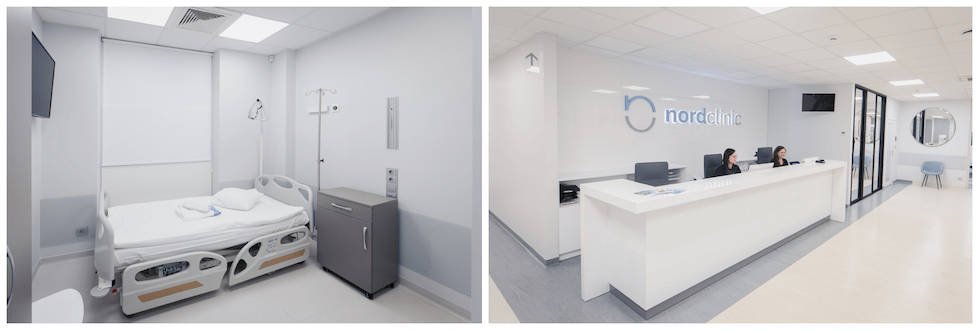Gastric band to gastric bypass
We are one of the leading bariatric surgery clinics for medical tourists in the European Union. We are proud of the fact that over 90 % of our patients come from the UK, Ireland, Norway, Sweden, Denmark, Germany, Switzerland and other countries.
See before-after pictures
Reviews and Facebook group
Our patients and clinic in the media
- Gastric band – 3.690 £
- Hiatal hernia repaired during weight loss surgery for FREE.
- Plastic surgery after a massive weight loss – from 580 £
Regular consultations with Prof. Almantas Maleckas in London
- accommodation with medical care – from 62 £ per night
- plastic surgeon consultation 12 months after surgery (if interested) – FREE
Regular price:
- consultation with the surgeon and anaesthesiologist
- all the necessary health tests before and after the surgery
- bariatric surgery
- anaesthesia
- hospital stay (1-3 days) with 24 hours medical care
- 24/7 personal assistance during your stay
- transfers to / from the airport, hotel and clinic
- diet instructions after bariatric surgery
- FREE dietician follow-up for 5 years (regular, not UK based)
Get your surgery for free by claiming a refund from your local health board. We cooperate with HSE and other health boards across the EU to help our Irish and EU patients receive a refund for their weight loss surgery in Lithuania. The clinic helps with the documents needed to claim a refund after following the EU directive route for medical treatment abroad.
Please note that the price of the surgery itself is provisional and may be accurately assessed only after the evaluation of each individual case.
The default currency at our clinic is EUR, so if you were looking at prices in GBP it may vary depending on GBP / EUR exchange rate at the moment of payment.
Things to consider when choosing a clinic and surgeon abroad:
- Is it a World-class surgeon with similar experience to ours (700 bariatric surgeries per year) ?
- Is bariatric staff available? We are one of the few clinics that has a specially trained bariatric nursing staff.
- Experience with bariatric anaesthesia? Anaesthesia of overweight patients requires skill and specialised experience, and our anesthesiologists have been specialising in bariatrics for over 15 years.
- Is it a multidisciplinary private hospital? Nordbariatric is a private clinic with modern facilities and exceptional care.
- Overall knowledge in the field? We have designed a unique bariatric mobile app. Our surgeon is the co-author of more than 40 scientific articles.
All of our patients can use one of our offers available at the moment.
- Additional services in our clinic. You or your accompanying persons can explore the various services by following this link. Customise your preferences and request to book any preferred procedures.
- Brand ambassador discount. If you have a community that would be interested in our services, you can now get a discount for your procedure by spreading the word about our clinic on your social media. Contact your customer service representative for more information.
- Recommendation discount. Get a discount for your next plastic or gynaecology procedure by recommending our clinic. Contact your customer service representative for more information.
- Gastric band – 4.200 €
- Hiatal hernia repaired during weight loss surgery for FREE.
- Plastic surgery after a massive weight loss – from 700 €
Regular consultations with Prof. Almantas Maleckas in London
- accommodation with medical care – from 74 € per night
- plastic surgeon consultation 12 months after surgery (if interested) – FREE
Regular price:
- consultation with the surgeon and anaesthesiologist
- all the necessary health tests before and after the surgery
- bariatric surgery
- anaesthesia
- hospital stay (1-3 days) with 24 hours medical care
- 24/7 personal assistance during your stay
- transfers to / from the airport, hotel and clinic
- diet instructions after bariatric surgery
- FREE dietician follow-up for 5 years (regular, not UK based)
Get your surgery for free by claiming a refund from your local health board. We cooperate with HSE and other health boards across the EU to help our Irish and EU patients receive a refund for their weight loss surgery in Lithuania. The clinic helps with the documents needed to claim a refund after following the EU directive route for medical treatment abroad.
Please note that the price of the surgery itself is provisional and may be accurately assessed only after the evaluation of each individual case.
The default currency at our clinic is EUR, so if you were looking at prices in GBP it may vary depending on GBP / EUR exchange rate at the moment of payment.
Things to consider when choosing a clinic and surgeon abroad:
- Is it a World-class surgeon with similar experience to ours (700 bariatric surgeries per year) ?
- Is bariatric staff available? We are one of the few clinics that has a specially trained bariatric nursing staff.
- Experience with bariatric anaesthesia? Anaesthesia of overweight patients requires skill and specialised experience, and our anesthesiologists have been specialising in bariatrics for over 15 years.
- Is it a multidisciplinary private hospital? Nordbariatric is a private clinic with modern facilities and exceptional care.
- Overall knowledge in the field? We have designed a unique bariatric mobile app. Our surgeon is the co-author of more than 40 scientific articles.
All of our patients can use one of our offers available at the moment.
- Additional services in our clinic. You or your accompanying persons can explore the various services by following this link. Customise your preferences and request to book any preferred procedures.
- Brand ambassador discount. If you have a community that would be interested in our services, you can now get a discount for your procedure by spreading the word about our clinic on your social media. Contact your customer service representative for more information.
- Recommendation discount. Get a discount for your next plastic or gynaecology procedure by recommending our clinic. Contact your customer service representative for more information.
Patient stories
Only we can offer:
One of the most experienced private bariatric clinic teams in Europe. More than 7.000 bariatric surgeries were performed by our surgeon to this date. A figure that no surgeon or clinic in a region can match.
The only clinic in Europe with a specially designed bariatric mobile app for patients after weight loss surgeries. Available in 6 languages on iOS as well as Android devices.
Watch Peter's gastric bypass story
Refund for EU patients
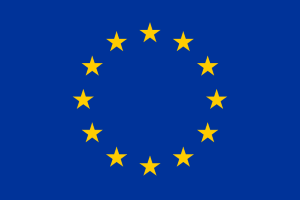
Get your surgery for free by claiming a refund from your local health board. The clinic helps patients with the documents needed to claim a refund after following the EU directive route for medical treatment abroad. It applies to patients who are insured under the systems of one of the EU countries and may not get the surgery due to long waiting times. On average our patients from the EU countries get fully refunded by their local health board in 3-5 months after their surgeries.
Bariatric Team

- Our surgeon Almantas Maleckas is a doctor of medical science
- UK General Medical Council (GMC) certified
- He performed over 7.000 bariatric operations
- A pioneer in laparoscopic surgery in the region
- More than 15 years working experience in Sweden, Gothenburg University hospital
- Works both in Lithuania and Sweden, speaks fluent English and Swedish
- London School of Economics graduate
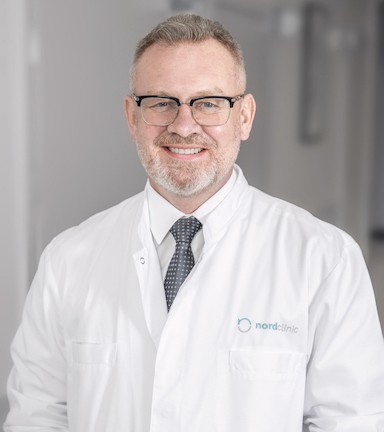
- Our surgeon Nerijus Kaselis is a doctor with a degree in medicine
- Member of the International Federation of Obesity
- Has been practising abdominal surgery for over 32 years, specialising in bariatric surgery for the past 18 years
- Was the first surgeon to perform various laparoscopic surgeries in Lithuania
- Works as a team lead of surgeons in complicated obesity surgeries abroad
- Has international work and study experience
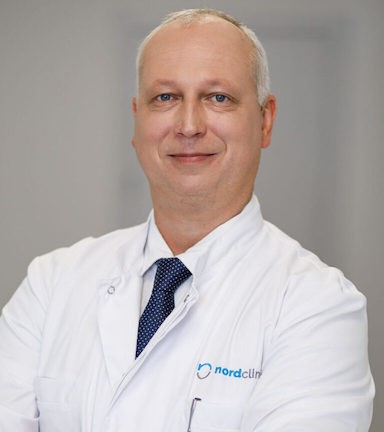
- Our surgeon Linas Venclauskas has over 15 years of experience
- Specialises in minimally invasive surgery, surgical treatment of the upper gastrointestinal tract and bariatric surgery
- Associate Professor at Lithuanian University of Health Sciences
- President of the Kaunas Society of Surgeons
- A member of the European Hernia Society
- Chairman of the Lithuanian Society of Hernia Surgery

- Our surgeon Aurika Karbonskiene has over 25 years of experience as anesthesiologist
- Over 15 years of experience as a bariatric anesthesiologist
- Since 2008 – Associate Professor at Lithuanian University of Health Sciences
- Board member of Lithuanian Society of Anesthesiologists and Intensive Care Physicians
- Member of the European Society of Anesthesiology
- Researcher and coordinator at the Clinical Trial Network of European Society of Anesthesiology

- Our surgeon Almantas Maleckas is a doctor of medical science
- UK General Medical Council (GMC) certified
- He performed over 7.000 bariatric operations
- A pioneer in laparoscopic surgery in the region
- More than 15 years working experience in Sweden, Gothenburg University hospital
- Works both in Lithuania and Sweden, speaks fluent English and Swedish
- London School of Economics graduate

- Our surgeon Nerijus Kaselis is a doctor with a degree in medicine
- Member of the International Federation of Obesity
- Has been practising abdominal surgery for over 32 years, specialising in bariatric surgery for the past 18 years
- Was the first surgeon to perform various laparoscopic surgeries in Lithuania
- Works as a team lead of surgeons in complicated obesity surgeries abroad
- Has international work and study experience

- Our surgeon Linas Venclauskas has over 15 years of experience
- Specialises in minimally invasive surgery, surgical treatment of the upper gastrointestinal tract and bariatric surgery
- Associate Professor at Lithuanian University of Health Sciences
- President of the Kaunas Society of Surgeons
- A member of the European Hernia Society
- Chairman of the Lithuanian Society of Hernia Surgery

- Our surgeon Aurika Karbonskiene has over 25 years of experience as anesthesiologist
- Over 15 years of experience as a bariatric anesthesiologist
- Since 2008 – Associate Professor at Lithuanian University of Health Sciences
- Board member of Lithuanian Society of Anesthesiologists and Intensive Care Physicians
- Member of the European Society of Anesthesiology
- Researcher and coordinator at the Clinical Trial Network of European Society of Anesthesiology
5-year follow up with dietitian
Nutrition is one of the main focus after weight loss surgery to maximize weight loss and prevent weight gain. We offer a dietitian who will talk with you about the diet you’ll need to follow after surgery, explaining what types of food and how much you can eat at each meal. Karolina is a dietitian and Nutrition Consultant with a degree in the medical field. Read more about her here.
11 reasons that make us the most popular bariatric clinic abroad
Our team of 3 bariatric surgeons has 15-20 years of experience in the field in total performing over 500 different bariatric surgeries per year. Moreover, our surgeons are members of various prestigious surgical societies both Lithuanian and international. Our leading bariatric surgeon Dr Almantas Maleckas has performed more than 7.000 bariatric surgeries. He is fluent in four languages, among which English and Swedish. The surgeon has been regularly working in Sweden for over 15 years. Dr Maleckas is a pioneer of laparoscopic surgery in Eastern Europe and has trained many other bariatric surgeons in the region.
We are one of the leading bariatric surgery clinics for medical tourists in the European Union. We are proud of the fact that over 90 % of our patients come from the UK, Ireland, Norway, Sweden, Denmark, Germany, Switzerland and other countries.
We are trusted by our patients and we appreciate all the reviews and feedback collected over the years. Find testimonials here or on Google.
Already more than 5.000 of our former, current and future patients joined our online community with the aim to build a space for opinions and mutual support. Members are welcome to share experiences about their visit to the clinic and to discuss all surgery-related matters.
We offer a 5-year follow-up which includes being able to get in touch with our Lithuanian dietitian Karolina. She is consulting patients after surgery and is available upon request to answer postoperative nutritional questions for five years after surgery.
Our clinic is the only clinic that has developed its own app designed specifically for bariatric patients – Bariatric IQ. The most useful feature of this app is special bariatric diet recommendations based on a particular product, a patient’s gender, time after surgery and other factors. Such a feature has not been replicated by any other bariatric apps in the world. Read more and download the app on your IOS or Android smartphone here.
Our clinic works according to the highest standards set by the European Union. This helps to guarantee the quality of medical services. We care about the safety, comfort and successful results of our patients from all over the world.
The clinic helps patients with the documents needed to claim a refund after following the EU directive route for medical treatment abroad. It applies to patients who are insured under the systems of one of the EU countries and may not get the surgery due to long waiting times.
We provide customer service in 9 foreign languages including English, Swedish, Norwegian, Danish, Italian, Spanish, French, Russian, Polish. Everyone in our clinic speaks English, including nurses, assistants and the surgeon.
Combining different plastic surgery procedures to offer optimal treatment for post-bariatric patients has been our plastic surgery department’s specialisation for many years now. We have performed such surgeries for more than 10.000 patients to this date. Since weight loss patients often require multiple surgical procedures to address excess skin, surgery planning and surgeons’ experience are very important. We carefully select patients, evaluate each case individually, and only agree to combine surgeries within health & safety limits. Our team of 9 plastic surgeons performs more than 3.000 plastic operations a year, a number that no other clinic in Central & Eastern Europe can match.
Special bariatric app for your mobile phone
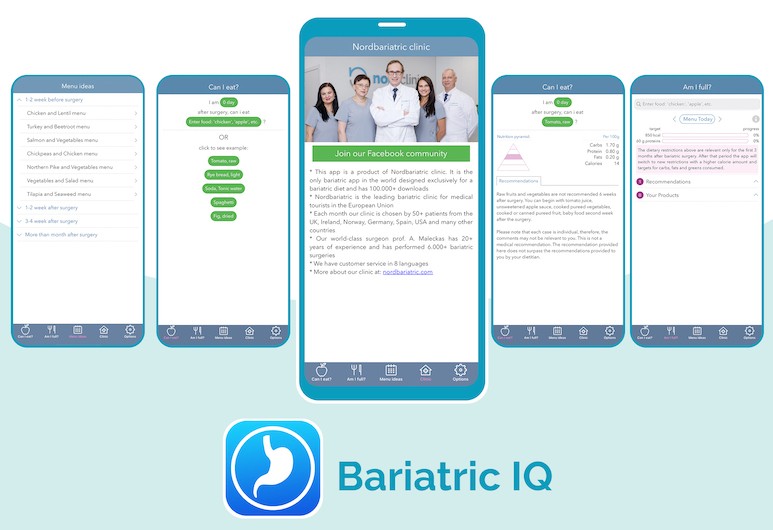
- Created by Nordbariatric clinic
- Special bariatric diet recommendations based on a particular product, a patient’s gender, time after surgery and other factors
- Available in 6 languages
- Available on iOS as well as Android.
- To this date the app was downloaded more than 100.000 times!
- Read more
Our clinic

Self-catered accommodation with medical care
Why has my band stopped working?
The success of a gastric band surgery depends on many factors, especially on your ability to stick to lifestyle changes. Gastric banding is considered unsuccessful if you fail to lose more than 50 % of your excess body weight or experience complications, such as stomach stretching, heartburn, band slippage, erosion, or intolerance. Some complications can be managed non-surgically through band adjustments or patient re-education, while others may need additional surgery.
Most of the gastric band surgery complications are related to your lifestyle. If you are not losing enough weight because of poor eating habits, there is an option to be re-educated on appropriate dietary behaviors (e.g. consuming smaller portions and avoiding liquids while eating). Most of the complications after gastric band insertion are caused by overeating. Such behavior not only results in weight gain but also leads to dilated esophagus or band slippage. Sometimes gastric band malfunctioning may be linked to individual anatomical changes, such as stomach stretching or band erosion. Fortunately, the removal of the gastric band provides immediate relief of adverse symptoms and ensures further weight loss.
FAQ sessions with our surgeon
Watch full list of interview sessions on our Youtube channel.
What are my options?
If a gastric band has failed to help you lose weight, there are two main options that you can consider.
The gastric band can be completely removed without converting into any other weight loss method. It is a relatively low-risk procedure performed laparoscopically through the same incisions made during gastric band placement. However, without conversion patients usually experience a sudden weight gain.
In order to continue with a stable weight loss, you may choose to have a revision into gastric bypass or gastric sleeve. Patients who undergo conversion surgery have the same success rates as those who choose to undergo gastric sleeve or gastric bypass in the first place.
During gastric bypass, a stomach is divided into two pouches. A bigger pouch only produces gastric juice while a smaller one processes food and connects the oesophagus to the small intestine, bypassing the duodenum (first part of the small intestine). Gastric bypass surgery results in a smaller stomach, reduces food absorption, and promotes favorable changes in appetite-regulating hormones. Additionally, gastric bypass redirects the flow of acid and bile away from the esophagus, which makes it an effective way to treat oesophageal reflux. In sleeve gastrectomy, the stomach is shaped into a tube-like structure. After the surgery, the stomach produces lower levels of hunger hormones and can also process a smaller amount of food.
As many as 80 % of all patients can have a gastric band removal and conversion procedures performed in one surgery. However, in some cases (especially when excessive scarring of the stomach and a lot of adhesions are present) it is better to wait a few months and let the stomach heal until converting into gastric bypass or gastric sleeve.
How do I prepare for surgery? What pre-op tests are needed?
If revision surgery is indicated, you will have to undergo medical tests, including a complete blood count, urine analysis, electrocardiogram (ECG), and gastroscopy, to accurately assess your state of health. Also, there are other medical tests that might be required, such as lung or kidney function assessment. These tests are performed in order to check for possible underlying problems such as liver malfunction, high blood cholesterol levels, or the presence of excess fluid in the tissues.
Two weeks before the surgery you should stop taking blood-thinning medicines, such as aspirin or ibuprofen, and avoid consuming other blood-thinning substances (e.g. fish oil, garlic).
Keep in mind that tobacco and alcohol consumption should be ceased one month before and one year after the surgery.
There are no specific dietary recommendations for the day before the surgery apart from that you should eat lightly and avoid binge eating. Have a shower the night before your procedure. Refrain from eating or drinking anything 12 hours before the surgery.
How will my diet look like?
For a few days after your surgery you will be able to consume only liquids, such as juices, jelly, or diluted broth. Avoid carbonated and caffeinated drinks as well as drinks which are high in sugar as these can contribute to acid reflux or gas formation.
During the first two weeks post-surgery, you should transition from consuming clear drinks to more dense liquids. Your diet will consist of protein shakes, blended soups, low-calorie milk, and yogurt. You may also increase protein intake by adding powdered milk, or eggs to your soups. Drink a glass of water between your meals and take multivitamins daily.
On the third week you can begin eating very small portions of solid food, like pureed vegetables, boiled or scrambled eggs, lean mashed fish or poultry. Bread and meats which are difficult to chew should still be avoided.
During weeks four to eight you should already consume approximately 500 kcal a day. A standard meal plan consists of 5-6 small meals, measuring 1/4 cup for solid food and 1/2 for liquids. You can make slight adjustments to the menu according to your taste preferences, however, you should still avoid fibrous fruit, chewy meats, potatoes, and other foods high in carbohydrates.
Two months after the surgery your caloric intake should be increased to approximately 1000 kcal a day with at least 70 grams of protein. It is important to consume 5-6 small nutritious meals a day. By this time, you should have adopted healthy eating habits that are to stay with you for the rest of your life.
Recovery after the surgery
The recovery after revision surgery can take longer than the original weight loss surgery as it is slightly more complex. Thus, patients need to spend 1-3 nights in the hospital for close monitoring.
You may begin walking and resume usual activities, such as showering, the same day after your surgery. However, do not take baths for the first 2 weeks.
When back home, you should be able to prepare meals for yourself and do simple activities. You may need to take 3-4 weeks off from work. Feeling more tired than usual is completely normal, so take more time to rest and relax. Try to keep tiring activities to a minimum. Take pain medication as prescribed by your doctor. Resume walking in slow-pace when you feel comfortable to do so. If you were taking blood-thinning drugs before the surgery, make sure to consult your doctor about when you should resume the medication.
As for incision care, do not wear tight clothes that might rub against your bandages. It is normal for the skin around the incisions to be red or slightly bruised, however, contact your doctor if you notice significant swelling or bleeding. Change your bandages daily and keep them clean and dry. Do not use alcohol or hydrogen peroxide.
Advantages and disadvantages of gastric band conversion surgery
Advantages:
- Revision surgery is just as effective as gastric bypass or gastric sleeve surgeries, resulting in approximately 70% of excess weight loss.
- You will notice significant long-term weight loss and an overall improvement with weight-related health problems.
- Revision surgery will almost instantly resolve unpleasant symptoms associated with gastric banding (vomiting, tension in the stomach, and acid reflux).
- After a conversion to gastric bypass or gastric sleeve, your stomach will be much smaller, which will result in feeling less hungry.
Disadvantages:
- Revision surgery possesses a higher complication risk since it involves dealing with scar tissue.
- Hospital stay might be a day or two longer than after original weight loss surgery.
- Gastric bypass or gastric sleeve can lead to vitamin or iron deficiencies (anemia).
Send us your enquiry






